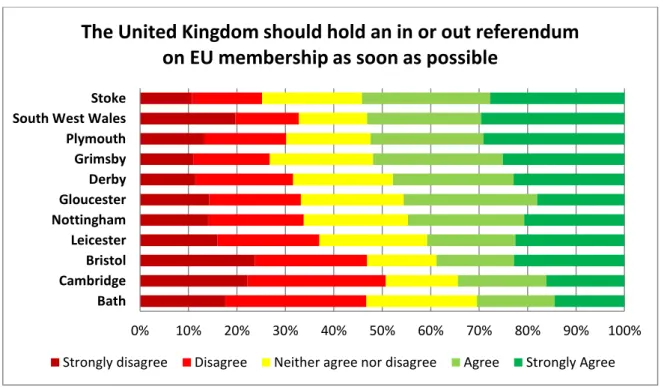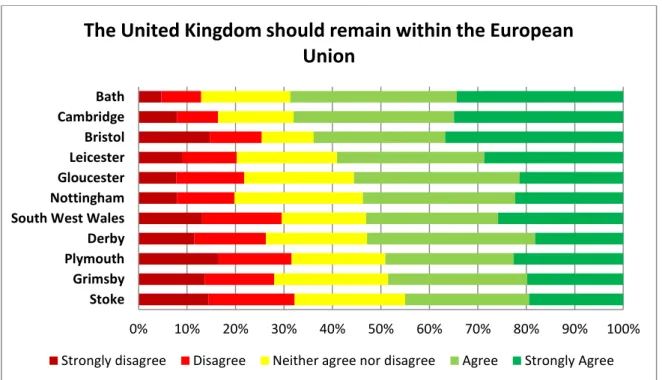Most Britons Oppose “Brexit” a Nationwide Survey Finds
Voters believe that the UK should remain within the European Union, although many in favour of a membership referendum taking place.
Data from 14,000 responses to the Election Compass UK questionnaire shows voters are rather positive over Britain’s EU membership. Even though 43.6% of those surveyed are in favour of a membership referendum taking place, compared to 37.1% who would oppose such plebiscite, only 22.4% would actually support a British exit from the EU.
Figure 1 below reveals that, in accordance with the parties’ stances on the matter, supporters of UKIP are vehemently supportive of a referendum on EU membership, with 89.7% of them in favour and only 5% opposing the proposal. Cameron’s pledge to organise a referendum on the matter, should the Conservatives win the election, has apparently resonated with the Conservative electorate, with 60% of Conservative sympathisers agreeing that a referendum should take place as soon as possible. Conversely, sympathisers of the centre-left and regional parties are overwhelmingly opposed to organising an “in or out” referendum, with Labour, Liberal Democrat and Green supporters most opposed to the proposal.
Figure 1. Answers to the statement “The United Kingdom should hold an in or out referendum on EU membership as soon as possible” per party preference
Source: Election Compass UK
0% 10% 20% 30% 40% 50% 60% 70% 80% 90% 100%
Labour Lib Dems Green Party SNP Plaid Cymru Conservative UKIP Population
The United Kingdom should hold an in or out referendum
on EU membership as soon as possible
Figure 2 reveals a very different pattern, showing that voters are much more supportive of organising a referendum on EU-membership than they are of the UK leaving the EU. Overall, 57.7% of the survey population agree that the UK should remain within the EU. When looking at the proportions of (dis)agreement by party preference, it is obvious that UKIP supporters have a radically differing preferences compared to the rest of the British electorate – 76% of UKIP supporters do not consider that the UK should remain within the EU, compared to less than 10% who would prefer remaining within the EU. Conservative supporters are rather divided on the topic, albeit a larger portion of them would oppose an eventual “Brexit” (44.3%), compared to 28.8% in favour. Green, Labour and Liberal Democrat supporters are most opposed to an EU exit, with more than 80% of each of the three voter groups being supportive of EU membership. Plaid Cymru and SNP voters are also overwhelmingly opposed to a “Brexit”.
Figure 2. Answers to the statement “The United Kingdom should remain within the European Union” per party preference
Source: Election Compass UK
0% 10% 20% 30% 40% 50% 60% 70% 80% 90% 100%
UKIP Conservative SNP Plaid Cymru Lib Dems Labour Green Party Population
The United Kingdom should remain within the European
Union
Figure 3 reveals the opinion of only those respondents who agree that an in or out referendum on EU membership should take place on actual EU membership. The results reveal that those who would like a referendum to take place will not necessarily vote in favour of “Brexit”. Clearly, compared to the general survey population, a larger proportion of these respondents would favour a UK exit from the EU (47.7% against 27.3%). With regard to party preference, UKIP and Conservative supporters are once again shown to be the most ill-disposed towards continuing EU membership, followed by Labour, SNP, Lib Dems, Green and Plaid Cymru supporters.
Figure 3. Answers to the statement “The United Kingdom should remain within the European Union” of those who agree that there should be a referendum on EU membership
Source: Election Compass UK
When respondents are distinguished per city (Figure 4), the results indicate that there is a considerable variation with regard to agreement that a referendum on EU membership should be held as soon as possible. Less than half of the respondents in Bath, Cambridge, Bristol, Leicester, Nottingham, Gloucester and Derby are in favour of the plebiscite taking place. On the other hand, more than half of the respondents from Stoke, South-West Wales, Plymouth and Grimsby are in favour of organizing the referendum.
0% 10% 20% 30% 40% 50% 60% 70% 80% 90% 100%
UKIP Conservative Labour SNP Lib Dems Green Party Plaid Cymru Population
The United Kingdom should remain within the European
Union
Figure 4. Answers to the statement “The United Kingdom should hold an in or out referendum on EU membership as soon as possible” per city
Source: Election Compass UK
Figure 5 illustrates a very similar pattern: with regard to the statement “The United Kingdom should remain within the European Union”, Bath, Cambridge, Bristol and Leicester appear to have the most Euro-enthusiastic population, at least when it comes to the cities included. Again, respondents from Stoke, Grimsby and Plymouth hold the most Eurosceptic opinions, with less than 50% of them agreeing that the UK should remain within the EU. It is worth noting, however, that the proportion of voters who do not agree that the UK should remain within the EU is considerably smaller than the proportion of those who agree.
0% 10% 20% 30% 40% 50% 60% 70% 80% 90% 100%
Bath Cambridge Bristol Leicester Nottingham Gloucester Derby Grimsby Plymouth South West Wales Stoke
The United Kingdom should hold an in or out referendum
on EU membership as soon as possible
Figure 5. Answers to the statement “The United Kingdom should remain within the European Union” per party preference
Source: Election Compass UK
0% 10% 20% 30% 40% 50% 60% 70% 80% 90% 100%
Stoke Grimsby Plymouth Derby South West Wales Nottingham Gloucester Leicester Bristol Cambridge Bath




